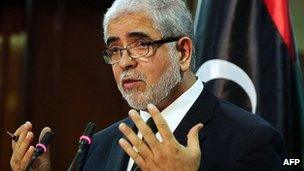Libyan Prime Minister Mustafa Abu Shagur dismissed
- Published

Libya's Prime Minister-elect has been dismissed from his post, after failing for a second time to win parliamentary approval for a new cabinet.
Mustafa Abu Shagur had called for the formation of an "emergency government", consisting of just 10 ministries.
The General National Congress (GNC) voted 125 to 44 against the proposal. Seventeen members abstained.
Mr Shagur was Libya's first elected prime minister following last year's overthrow of Col Muammar Gaddafi.
He had served as deputy prime minister for more than a year under interim leader Abdurrahim al-Keib.
The GNC now has three to four weeks to elect a new premier.
Political games
Mr Shagur's second and final offer consisted of just 10 ministries, as opposed to the 29 he offered last week.
Before the vote he told the GNC it was a proposal to lead Libya with no regionalism, and urged members to "assume its responsibilities at this historic time".
"In face of the dangers threatening the country, I present to you a crisis government restricted to 10 ministers, rejecting all geographical considerations," Mr Shagur earlier told the GNC.
His first cabinet line-up was rejected late on Thursday on the basis that it was not representative of important regions and lacked qualified members.
The BBC's Rana Jawad in Tripoli says some cities like Zawiya, Benghazi, and Misrata, lost a lot of fighters during the battle to overthrow Gaddafi, and are demanding greater representation in the new government.
During the assembly debate, protesters - mostly from Zawiya - stormed the Congress building in the capital Tripoli, calling for the prime minister's resignation.
Mr Shagur had initially aimed for a unity government and what he described as "people with merit" to work with him.
However, he said that when he consulted with political parties, some had pursued their own agendas. He said one party had demanded 11 seats, and another nine.
Mr Shagur has said he would not give in to pressure and political games.
He studied at the University of Tripoli before moving to the US, where he earned a PhD and worked as an academic and optical engineer.
Mr Shagur returned in 2011 to become an adviser to the National Transitional Council, which was formed during the revolt that ousted Gaddafi.
In September, he was elected by the national assembly to be the country's next prime minister, in a run-off vote in which he narrowly beat Mahmoud Jibril - who served as interim prime minister following the overthrow of the regime.